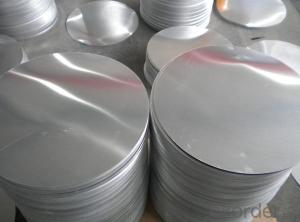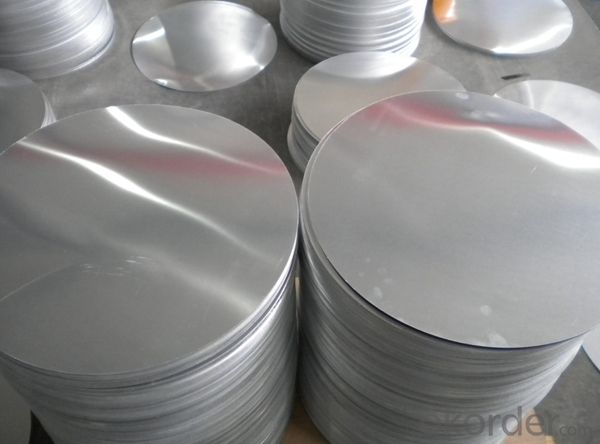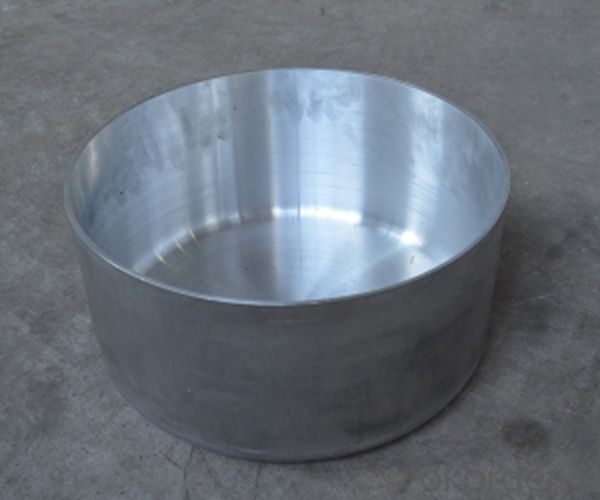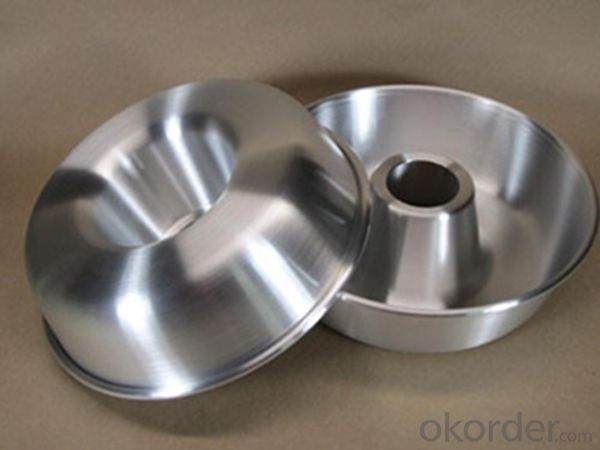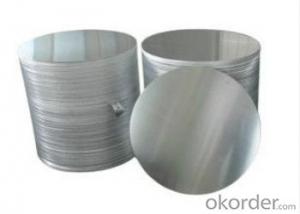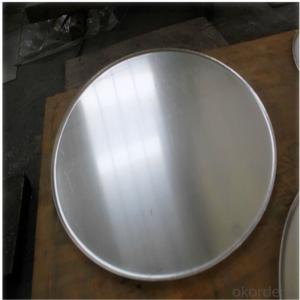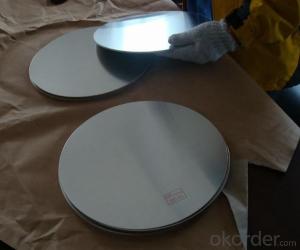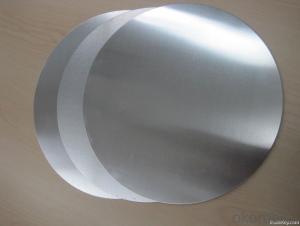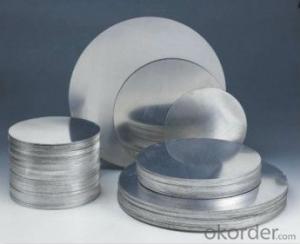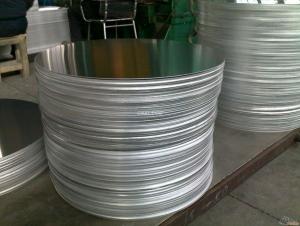2mm Aluminum Coil DC Aluminium Circles for Deep Drawing Pots
- Loading Port:
- Shanghai
- Payment Terms:
- TT OR LC
- Min Order Qty:
- 5 m.t.
- Supply Capability:
- 1000 m.t./month
OKorder Service Pledge
OKorder Financial Service
You Might Also Like
Specification
1. Structure of DC Aluminium Circles for Deep Drawing Pots Description
DC Aluminium Circles for Deep Drawing Pots is one semi-finished aluminium material. This coil can be rolled down to aluminium coil,sheet,circle ect. The alloy AA1050 is widly used in building, industry ect. Its weight is much lower than steel. So many customers choosed aluminium material instead of steel.
2. Specification of DC Aluminium Circles for Deep Drawing Pots
DC Aluminium Circles for Deep Drawing Pots | |
Main Specification | |
Alloy | AA1xxx (AA1050, AA1060, AA1070, AA1100 etc.) |
AA3xxx (AA3003, AA3004, AA3005, AA3105 etc.) | |
AA5xxx, AA6XXX (AA5052,AA5083, AA5754, AA6061, AA6062 etc.) | |
AA8xxx(AA8011, AA8006 etc.) | |
Temper | H14,H16, H18, H22, H24, H26, H32,O/F, T4, T6, T651 |
Thickmess | 0.01mm-100mm |
Width | 30mm-1700mm |
Standard | GB/T 3880-2006/ASTM |
Special specification is available on customer's requirement | |
3. Application of DC Aluminium Circles for Deep Drawing Pots
(1).Interior: wall cladding, ceilings, bathrooms, kitchens and balconies, shutters, doors...
(2).Exterior: wall cladding, facades, roofing, canopies, tunnels,column covers , renovations...
(3).Advertisement: display platforms, signboards, fascia, shop fronts...
4. Feature of DC Aluminium Circles for Deep Drawing Pots
Surfact Quality :
Be free from Oil Stain, Dent, Inclusion, Scratches, Stain, Oxide Dicoloration, Breaks, Corrosion, Roll Marks, Dirt Streaks and other defect which will interfere with use,
Mechenical Property:
Chemical Composite and Mechanical Property
5. Certificate of DC Aluminium Circles for Deep Drawing Pots
SGS and ROHS(if client request, paid by client), MTC(plant provided), Certificate of Origin(FORM A, FORM E, CO), Bureau Veritas and SGS (if client request, paid by client), CIQS certificate
6. Image of DC Aluminium Circles for Deep Drawing Pots
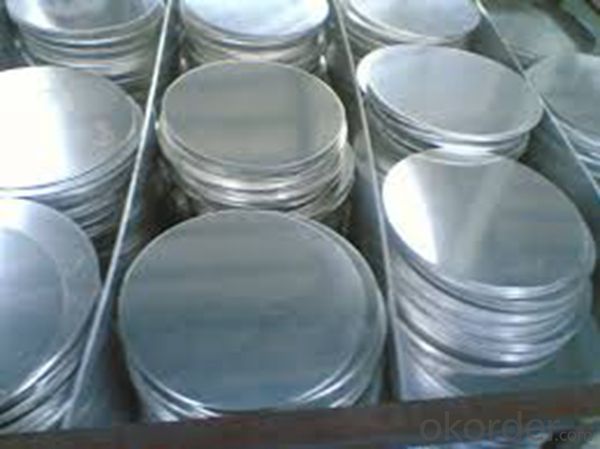
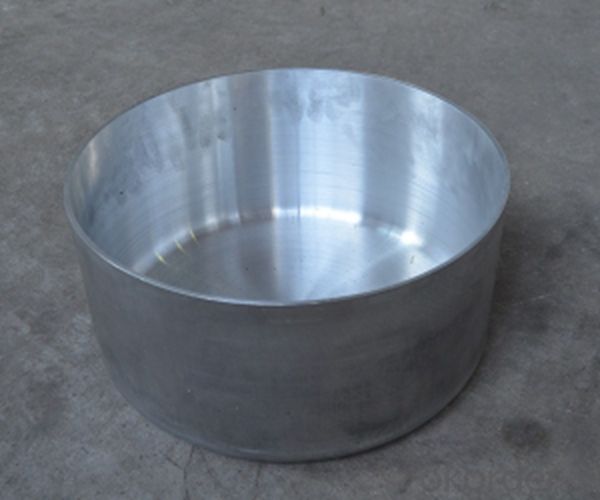
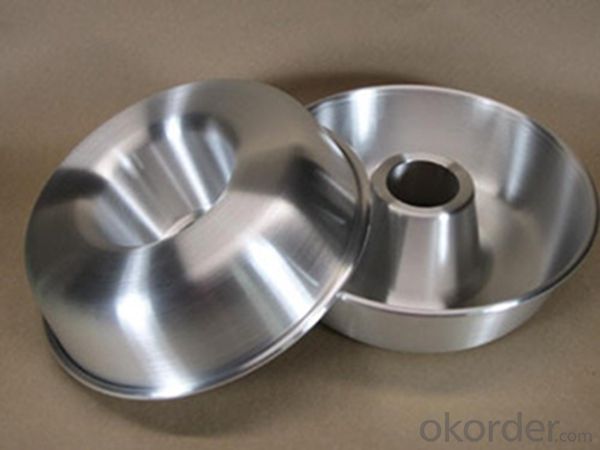
7. Package and shipping of DC Aluminium Circles for Deep Drawing Pots
First, plastic cloth with drying agent inside; Second, Pearl Wool ; Third, wooden cases with dry agent , fumigation wooden pallets, aluminum surface could cover blue PVC film
8. FAQ
1) What is the delivery time?
Depends on actual order, around 20 to 35 days
2) What is the QC system:
We have QC staff of 20 persons and advanced equipment, each production is with MTC traced from Aluminum ingot lot.
3) What market do you mainly sell to?
Australia, America, Asia, Middle East, Western Europe, Africa etc
- Q: I own a pistol with an aluminum frame. If I were to store it away for a long time, would I need to bother wiping oil over the aluminum surfaces in addition to the steel surfaces? If it helps, there is a dark grey sort of finish on the aluminum.
- Yes!!!! ......... Oil it.... No aluminum doesn't rust in the common sense like steel does...... But aluminum does oxidize like all metals.... Being in a damp area for the long term, just touching a different type of metal or even just time will make aluminum oxidize..... Put a light coat of oil on it.... Do a science experiment if you don't believe me.... Cut open a beer can.... Put it outside but out of the weather also.... leave it there for several months - maybe a year -- then take a look at it.... You will note it has faded and may even have an aluminum oxide powder on it from being exposed to air..... Guns are expensive -- Just keep it oiled.....
- Q: What are the common surface finishes for aluminum coils in the automotive industry?
- Aluminum coils are extensively utilized in the automotive sector for various purposes due to their lightweight, high strength, and resistance to corrosion. To safeguard them from environmental elements and improve their appearance, aluminum coils in the automotive industry often undergo surface treatments. Anodizing is one of the most prevalent surface treatments for aluminum coils in the automotive industry. It is an electrochemical process that forms a thin protective layer on the surface of the aluminum coil. This treatment not only offers excellent corrosion resistance but also allows for customization of colors, making it a popular choice for automotive applications. Anodized aluminum coils can be found in a variety of colors and finishes, adding aesthetic appeal to vehicles. Another commonly employed surface treatment for aluminum coils in the automotive industry is powder coating. This technique involves applying dry powder paint onto the aluminum coil's surface and then curing it under heat to create a durable and long-lasting finish. Powder coating provides exceptional resistance to chipping, scratching, and fading, making it ideal for automotive components exposed to harsh conditions that require high durability. Moreover, powder coating offers a wide range of color options, enabling manufacturers to achieve the desired aesthetic appearance. Additionally, aluminum coils in the automotive industry may undergo other surface treatments like laminating, painting, or polishing, depending on specific application requirements. Laminating involves bonding a thin protective film onto the surface of the aluminum coil to provide additional protection against abrasion and chemical exposure. Painting entails the application of liquid paint onto the aluminum coil's surface, allowing for customization and protection against corrosion. Polishing, on the other hand, is a mechanical process that enhances the surface smoothness and appearance of the aluminum coil, resulting in a reflective and glossy finish. To summarize, the automotive industry commonly employs surface treatments such as anodizing, powder coating, laminating, painting, and polishing for aluminum coils. These treatments not only enhance the appearance of the aluminum coils but also provide protection against corrosion, abrasion, and other environmental factors, making them indispensable in the manufacturing of automotive components.
- Q: This question asks for methods to protect aluminum coils from damage during storage and transportation.
- <p>To prevent damage to your aluminum coil during storage or transportation, follow these guidelines: Store the coils in a dry and clean environment to prevent moisture and dirt accumulation. Ensure that the storage area is well-ventilated to avoid condensation. Use appropriate padding or separators between coils to prevent scratching or denting. Handle the coils with care, using proper lifting equipment to avoid dropping or mishandling. Secure the coils during transportation to prevent movement that could lead to damage. Keep the coils away from corrosive substances and extreme temperatures. Regularly inspect the coils for any signs of damage and address any issues promptly.</p>
- Q: What are the dimensions of an aluminum coil?
- The dimensions of an aluminum coil can vary depending on the specific application and manufacturer. However, common dimensions for aluminum coils range from 0.15mm to 8mm in thickness, and from 20mm to 2000mm in width. The length of an aluminum coil can be customized to meet specific requirements.
- Q: What are the different types of surface treatments for corrosion resistance?
- There are several different types of surface treatments that can be used to enhance corrosion resistance in various materials. These treatments can be categorized into mechanical, chemical, and electrochemical methods. 1. Mechanical surface treatments: These methods involve physically altering or modifying the surface of the material to improve corrosion resistance. Some common mechanical treatments include shot peening, sandblasting, and polishing. Shot peening involves bombarding the material with small metal pellets to induce compressive stresses, which helps to prevent corrosion. Sandblasting is a process of blasting the surface with abrasive particles to remove any existing corrosion and create a clean, smooth surface. Polishing involves the use of abrasives to create a smooth and reflective surface, which reduces the likelihood of corrosion initiation. 2. Chemical surface treatments: Chemical methods involve applying a chemical solution or coating to the material's surface to create a protective layer against corrosion. One commonly used chemical treatment is chromating, which involves the application of a chromate conversion coating. This coating provides a barrier against corrosion and also improves the adhesion of subsequent paint or coating layers. Another chemical treatment is anodizing, commonly used for aluminum surfaces. Anodizing creates a thick oxide layer on the surface, which enhances corrosion resistance and can also provide decorative finishes. Other chemical treatments include phosphating, passivation, and galvanizing, which involve the application of specific chemical solutions or coatings to protect against corrosion. 3. Electrochemical surface treatments: Electrochemical methods utilize the principles of electrochemistry to create a protective layer on the material's surface. One such method is electroplating, which involves the deposition of a thin layer of a more corrosion-resistant material onto the surface of the base material. This can be done using various metals, such as zinc, nickel, or chromium. Another electrochemical treatment is anodic protection, where a sacrificial anode is connected to the material, causing the anode to corrode instead of the material. This process is commonly used for pipelines and underground structures. Overall, the choice of surface treatment for corrosion resistance depends on the material, the intended application, and the desired level of protection. Each treatment method has its advantages and limitations, and it is important to consider factors such as cost, environmental impact, and performance requirements when selecting the appropriate treatment.
- Q: What is the melting point of aluminum coils?
- The melting point of aluminum coils is approximately 660 degrees Celsius or 1220 degrees Fahrenheit.
- Q: i want to save some money on my electricity bill, and i heard that aluminum foil rejects the heat that goes through the windows, also does it work with the cold?
- If this is a house then it is your determination, if this is an condominium then you will greater advantageous verify with the administrative. maximum construction do no longer decide for aluminum foil on the residing house windows because it degrades the appearance of the residing house/condominium.
- Q: This question asks about the impact of aluminum coils on the quality of welding. It seeks to understand the relationship between the material properties of aluminum coils and the outcomes of the welding process.
- <p>Aluminum coils can significantly affect welding quality due to their unique properties. Aluminum has a high thermal conductivity, which requires more energy to weld, and can lead to rapid heat dissipation, affecting the weld's uniformity. Oxides on the aluminum surface can also interfere with the welding process, causing porosity and poor joint strength if not properly cleaned. Additionally, aluminum's low melting point can lead to distortion and warping if not managed correctly. The use of appropriate filler materials, proper cleaning, and precise control of welding parameters are crucial to achieve high-quality welds with aluminum coils.</p>
- Q: Are aluminum coils suitable for decorative purposes?
- <p>Yes, aluminum coils can be used for decoration. They are lightweight, durable, and corrosion-resistant, making them ideal for various decorative applications. Aluminum coils can be shaped and colored to suit different design needs, often used in architectural features, interior design elements, and even in art installations. Their versatility and aesthetic appeal make them a popular choice for both commercial and residential decoration.</p>
- Q: Can aluminum coils be used in the production of heat sinks?
- Indeed, the utilization of aluminum coils is applicable in the manufacturing process of heat sinks. Aluminum, owing to its remarkable thermal conductivity and affordability, enjoys widespread usage as a material for heat sinks. These heat sinks are efficiently employed in the dissipation of heat emanated from electronic components like processors, power transistors, and LED lights. The coils can be fabricated into diverse forms and dimensions to fulfill particular heat dissipation prerequisites. Furthermore, aluminum possesses the advantages of being lightweight, resistant to corrosion, and readily accessible, rendering it an optimal selection for the production of heat sinks.
Send your message to us
2mm Aluminum Coil DC Aluminium Circles for Deep Drawing Pots
- Loading Port:
- Shanghai
- Payment Terms:
- TT OR LC
- Min Order Qty:
- 5 m.t.
- Supply Capability:
- 1000 m.t./month
OKorder Service Pledge
OKorder Financial Service
Similar products
Hot products
Hot Searches
Related keywords
